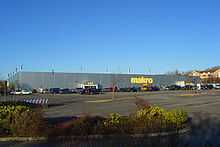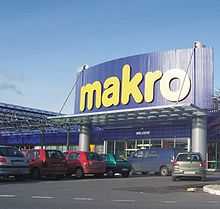Makro
|
| |
| Subsidiary | |
| Industry | Cash and carry |
| Headquarters | Düsseldorf (Metro AG), Utrecht (SHV) |
| Parent | Metro AG, SHV Holdings |
| Slogan | |
| Website |
Metro AG site SHV site Makro Site |


Makro is an international chain of Warehouse clubs, also called cash and carries. Originally a Dutch-based chain, the first one opened in Amsterdam in 1968. In the following years more stores opened in the Netherlands and in several other European countries and, in 1971, South Africa.[1] In the 1970s and 1980s Makro extended its business to the Americas and Asia. Makro had also expanded to the United States in the mid-1980s. In 1989, Kmart bought the American locations,[2] and converted most of them to Pace Warehouse in 1990. In 1998, Makro owner SHV Holdings sold the Makro stores in Europe to Metro AG.
Makro stores are not open to the general public (except in Belgium and Brazil), but only to businesses which have to be registered members in order to gain entry to the store.
Ownership
SHV originated in 1896 from a merger between a number of large coal mining companies, some of which had been active since the 18th century.
In 1968, The first Makro store opened in Amsterdam.
In 1971, The first Makro store outside Europe opened in South Africa (the South African stores were subsequently in 1990 exchanged for a shareholding in Massmart and in 2004 SHV sold its Massmart shares).
In 1998, All European Makro stores were acquired by Metro AG, the German retail and wholesale giant.
In 2010, Makro Cash & Carry Indonesia was sold to Lotte Mart and rebranded as Lotte Mart Wholesale.
In 2012, Metro sold the Makro UK business to Booker Group; and Makro-Habib in Pakistan became Metro-Habib.
In 2013, SHV sold Siam Makro Pcl. (Thailand) to CP ALL, a subsidiary of CP Group.
In 2014, Metro sold the Makro Greek business to Sklavenitis.[3]
Store locations
European stores can be found in the Netherlands, Belgium, Poland, the Czech Republic, Greece, Portugal, Spain and the United Kingdom. Stores have spread as far as South Africa, the Philippines, Thailand, and eastern Asia, Colombia, Peru, Venezuela, Argentina and Brazil (76 stores across Brazil).
Makro stores formerly existed in the United States (bought by Kmart in 1989 and converted into Pace Warehouses the following year), China, Indonesia (both bought by Lotte Mart and converted into such stores), Malaysia (bought by Tesco) and the Philippines (bought by SM Prime Holdings and converted into SM Hypermarket (14 Makro branches) and SaveMore Market (1 Makro branch)), in Pakistan (Makro-Habib).
Thailand
Siam Makro Public Company Limited was established in 1988. At the end of 2013 there were 64 Makro stores and 5 Siam Frozen Food stores in operation, serving a customer base of 2.5 million. Revenues for 2013 were THB130 billion, up 13% over 2012, with a net profit of THB4.3 billion, up 22% over 2012. Siam Makro shares are traded on the Stock Exchange of Thailand (SET). [4]
Product range
Makro sells food and non-food products, usually located in different sections of the store. Each store also contains a hot-food cafeteria, and a cash machine.
The food section always includes a fresh fish section, a wine section, fresh meat and butchery department, and refrigerated aisles. The non-food area includes clothing, DIY, office supplies, electricals, computing, and seasonals such as garden furniture.
Special offers are featured via a printed and online fortnightly brochure known as Makro Mail.
The stores are not open to the general public, but serve the following trades:
- Newsagent's shops and convenience stores.
- Restaurants, hotels and caterers.
- Schools, universities, sport clubs and associations.
Customers can shop at Makro with a membership card.
Makro UK used to have the tag-line "The UK's No.1 Discounter". This tag-line was replaced with "For Professionals". Makro has subsequently changed this to "Your business partner everyday".
Recent changes to the Makro UK structure include the closure of three stores: Wolverhampton, Coventry and Swansea. Metro have announced that the company has to be financially independent by 2011.
References
- ↑ Makro South Africa History Retrieved 9 October 2013.
- ↑ http://business.highbeam.com/4524/article-1G1-8242771/k-mart-absorbs-makro-boosts-clout-clubs
- ↑ "Germany's Metro Sells Greek Cash-And-Carry Ops". AFP. December 2014. Retrieved 18 February 2015.
- ↑ "Message from the Chairman and CEO". Siam Makro. Siam Makro. Retrieved 8 November 2014.
